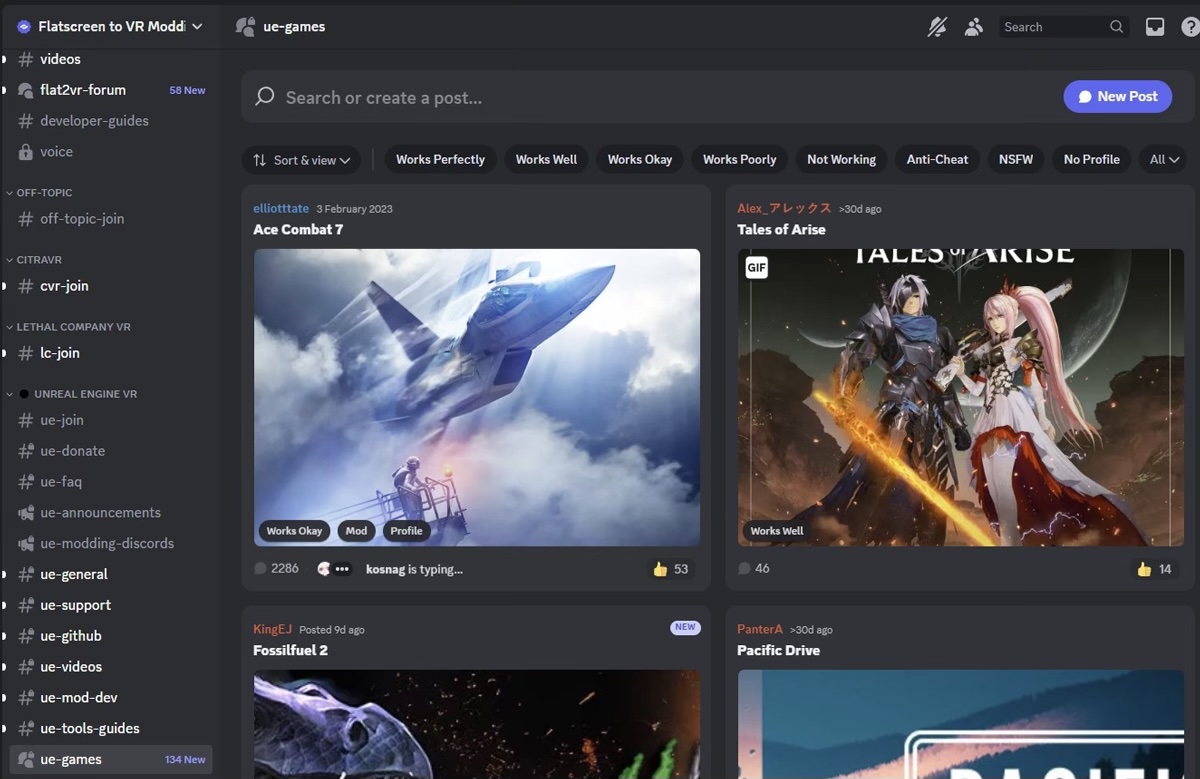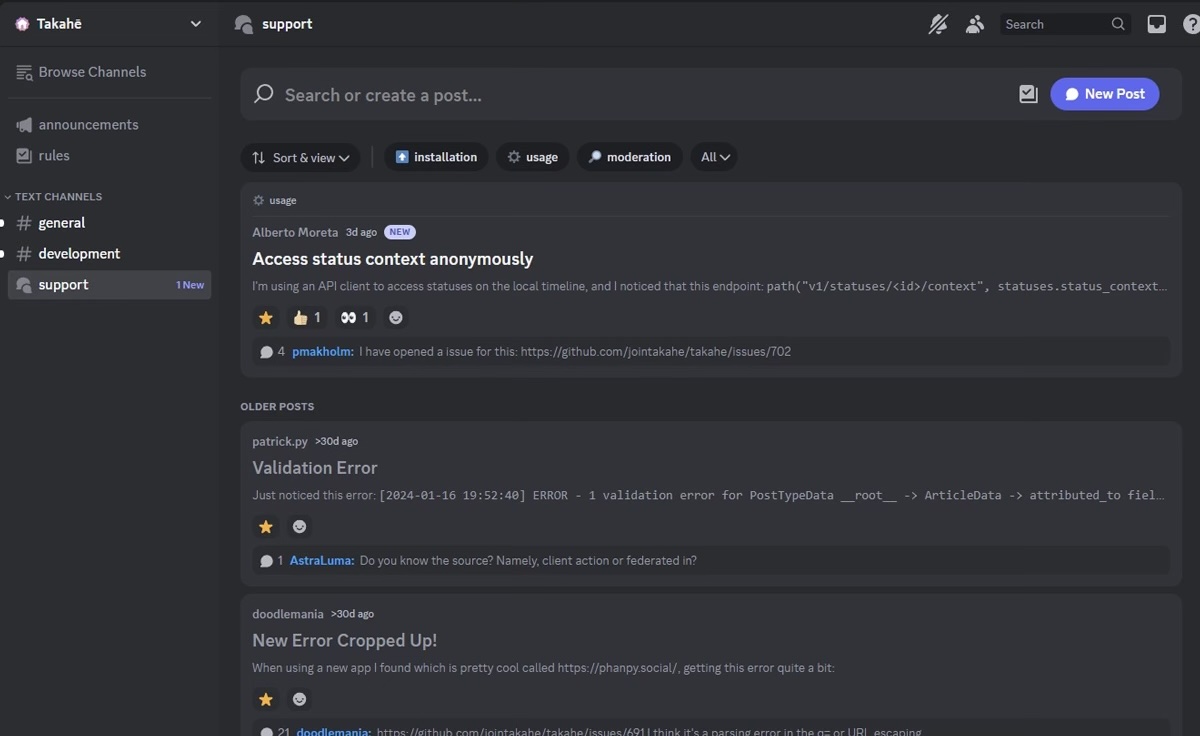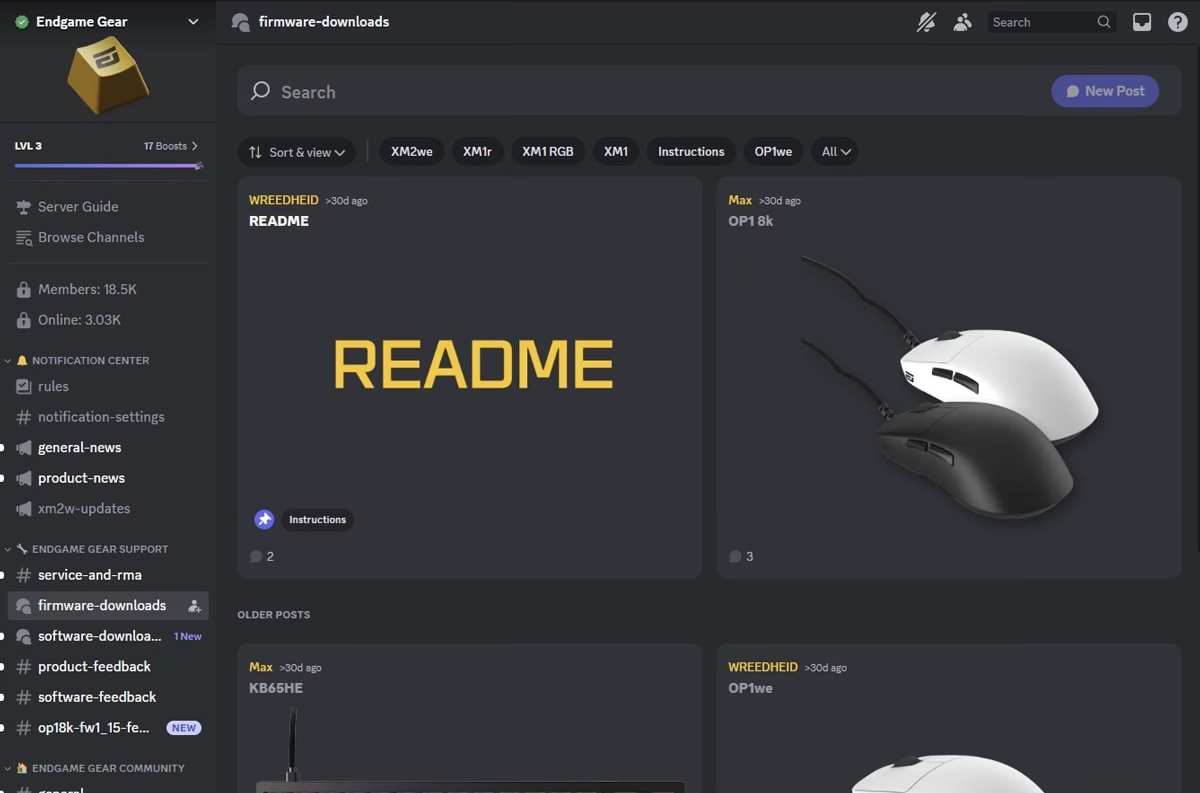"stop using Discord" is a very entitled ask
I think we have all been there. You are looking for some documentation, help or other information and all you see is a Discord server linked in a readme. Lately we have seen more and more information vanish as part of "the great entshittification of 202x", and chances are Discord will be joining the ranks of companies going through this process at some point.
There are three distinct problems I have seen called out using Discord to interact with your community and "store" knowledge.
- it is a centralised, for profit platform, and therefore anything you store there is beholden to the whims of Discord's decisions
- it locks information behind an account, therefore not truly open to the public
- general usability and accessibility, because have you tried to find anything in most severs?
All three of these are valid concerns and things to keep in mind when deciding where to put information about your project.
This post was in the making for some time and is not a direct response to any recent events (xz). I have seen this discussion happen on a regular basis and I wanted a single source to point people to who actually care about the why.
(Also keep in mind that just because I am using Discord as an example does not mean the same problems do not exist with other solutions.)
How did we end up here?
I have been electronically talking to people for a very long time. While I was at the tail end of the days of BBS, Usenet and mailing lists popularity, I have seen a lot after that come and go.
This is mostly my experience how things developed over the years and there is a good chance this does not reflect your experience. But the outcome will mostly be the same if you are complaining about Discord.
And I was decently involved when forums were on the rise, including as moderator and super mod for decently large ones.
One thing I can say for sure is that the problems we are facing are still the same as 20 years ago. Plus a few more.
I am knowingly ignoring BBS and usenet. They worked well for a very technical crowd, but from my perspective we reached mainstream adoption with forums when the Internet became more readily available.
Forums were fun. You set one up on a shared hoster for a few $ a month if you wanted it to look and feel "professional", or picked a free hoster injecting ads and a good, old .tk domain.
And people either came to your forum or they went to another one. There was choice. You picked a community that fit your preferences.
Sometimes the existence of new forums spread via IRC. Sometimes on the schoolyard. Sometimes via Astalavista.box.sk - the thing we used to search the web before Google.
But there were forums for everything. Linux distributions. Car makes. Games. W@r3Z. You name it. And all faced the same issues I mentioned above.
I think it is fair to say that forums have had a significant influence on shaping online communities, expectations and experiences for many of us.
You could also find some form of realtime chat - mostly IRC in my circles, but I heard about freenet and others being used as well - associated with the forum to further cultivate the community. And this was a big part of the culture around certain communities.
Exchanging information in near real time became more accessible and people enjoyed it. Faster feedback than posting on a forum and waiting a day or two for an answer.
It was only logical then, that at some point social media became more and more relevant, adding a new channel and new ways to reach people interested in a topic. And thanks to "keeping people engaged" algorithms it worked really well.
From what I have seen things developed in a fairly linear way:
- documentation in form of, well, documents
- discussions in usenet that lead to updating documentation
- forums to ask questions and have discussions sometimes leading to updating documentation
- real time chat to satisfy the need of immediate feedback not leading to anything at all
The further we moved away from a slow to a more real time medium, the more we forgot to update documentation on the way. Making knowledge less searchable and less accessible.
This surely is not a complete list and does not explain all the aspects that were in play. But it should give you an idea how the landscape change.
Where we are
Which leads us to today. Please remember that Discord is used as a synonym for the three problems I mentioned.
- it is a centralised, for profit platform
- it locks information behind an account
- general usability and accessibility
Why does it seem like Discord won? Or at least captured a significant enough market share for people to complain?
It seems like a natural next step based on how I experienced the development of things over the years.
Beside being real time, it is nearly no effort at all to get started, does not require any maintenance and provides lots of features people expect such as emoji reactions and file uploads.
Moderation The larger any platform grew, the more moderation was needed. Sometimes without having appropriate tools at hand. And a ban was only good until the next GMX account was created to simply sign up again.
Discord still needs manual moderation. But behavior on the extreme end or that can be automatically detected can lead to account bans. While the main problem remains unchanged, there is just this little bit more automation involved that sometimes makes your life easier - if you like it or not.
Maintenance The software needed to be maintained. "Sorry we are down while restoring the database" was something you expected to see at some point.
This is where a centralised, for profit solution usually shines.
You literally have to create an account and you are done.
Uptime? Updates? Security incidents? Not your problem anymore.
Money Servers needed to be paid for and sometimes the people who paid for the server vanished from the scene leaving an unmaintained forum behind.
With any "free" for profit platform you still pay for it, just not with money.
The Internet did an excellent job over the past decade to teach us this lesson. And most people seem comfortable with it or at least seem to accept it as monetisation options were often frowned upon. Just ask Discord about Nitro.
Where should we go to?
The lazy answer here is "anywhere but Discord".
And I say this is the lazy answer because most of the suggested alternatives do not address any of the problems we faced in the late 90s or early 00s (or now). Or new problems which were added to the mix over the last 20 years.
Any "free" platform, centralised or decentralised, needs to be paid for. It needs to be maintained. And it needs to be moderated.
These three basic requirements will not change. And these are three significant points that lead us to where we are.
There are platforms solving some of the problems. They address some of the reasons Discord is not considered a good solution to the problem.
But all of the platforms have one thing in common - they add other problems into the mix.
You can still host your own forum. But
- moderation is on the person or team hosting it
- maintenance is still an issue
- it needs to be paid for
And this assumes every user creates and manage an account per form or relies on a centralised platform for SSO.
You can move to any other "free" platform. But
- it will only stay free as long as they have money to burn or extract money from the content (cough train an LLM, show ads)
- changes owners
- is forced to pivot
So far we do not have a good alternative addressing the three main problems discussed here - and this ignores the smaller issues along the way.
Discourse Let us just look at one example, Discourse. You can either self host it or buy their smallest, unlimited members plat for $100 / month.
It checks a lot of boxes:
- it is on the market for a long time and GPL licensed
- support for local accounts and SSO
- Akismet integration to handle spam
- it is a forum, chat and knowledge base
The last communities I have seen discuss a migration to Discourse decided the maintenance and price was a show stopper. Two out of the big three problems.
And obviously people being unhappy that it requires JavaScript to work. In 2024. Outrageous (I also do not like this part, but that is not the hill one should die on at this point).
Luke warm take on this
OpenSource maintainers provide free labour. Often the result of their work is used in commercial environments making others money.
What do they often get in return?
- Demands by corporations who do not spend time or money on the project
- Demands by "users" - luckily most of the time no state sponsored threat actors (tbd)
- Continuous mistreatment
And those wo tried to make it a living to recuperate some of the cost and mental energy did not necessarily receive the support they deserved.
The fastest way to have someone take over or take interest in a project is relicensing it under a BSL / SSPL. No matter if sole maintainer or corporation.
What we expect the very same people to do is spend more of their time and money to maintain yet another system and community. Because we do not like the platform. Or the way search (does not) work.
I have not heard anyone claim Discord is a good solution and I wholeheartedly agree. I actively try to not use it.
But it is no maintenance, free to use and provides decent enough moderation features. It makes peoples life easier. I rather have this than nothing.
Which brings me back to the title of the blog post - asking (and which technically should be called "demanding") people to stop using discord is a very entitled ask.
Especially if there is no alternative suggested. Or an offer to help migrate, maintain and pay for one.
Done the right way There are a lot of things we can do to improve the current state of "documentation management" in Discord.
And this is a low entry option to contribute back to a project.
I do not necessarily mean creating documentation. Writing documentation, good documentation and great documentation are three very distinct activities and require a different skill set and experience.
But most can help organise information and make the existing tools work better while addressing some of the most common complaints.
There are projects using Discord to maintain a FAQ or knowledge base in a style that resembles a forum. Which makes a huge difference when trying to find information.
Flat2VR

Takahe

Endgame Gear even distributes firmware updates this way and it works well.

It is easy to visually filter topics, search works as expected and it addresses a major problem of knowledge vanishing in the eternal back scroll of some high traffic channels.
It might be feasible to create a bot logging the FAQ / knowledge channel to a separate platform making search more convenient and accessible.
We could already do this in the days of IRC, and Discords API from what I can tell enable us to do the same.
What does not, will not and never has help(ed) is complaining to people doing work for free that they should do more work for free and spend more of their money on something they might not even consider a problem.
Not everyone is able to help solve problems for various reasons. This is life.
Everyone should be allowed to raise concerns with something that exists if there is a problem with it.
But no one - and I literally mean no one - is entitled to demand things to change while they are not actively contributing to a solution or providing an acceptable alternative.
And even then we should consider our words very carefully. At some point and after enough time and money spend and mental abuse taken the person on the other end of the screen might simply walk away. What would we gain from that?